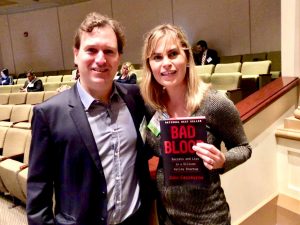 At the end of last year, I read Bad Blood: Secrets and Lies in a Silicon Valley Startup, by John Carreyrou. It describes the rise and fall of the firm Theranos, the multibillion-dollar biotech startup in Silicon Valley, headed by Elizabeth Holmes.
At the end of last year, I read Bad Blood: Secrets and Lies in a Silicon Valley Startup, by John Carreyrou. It describes the rise and fall of the firm Theranos, the multibillion-dollar biotech startup in Silicon Valley, headed by Elizabeth Holmes.
In short, Theranos was a promising blood test startup. It was founded in 2003 by Holmes, a 19-year-old Stanford dropout. It raised over $700 million in investment at a $9 billion valuation. It had a simple promise: hundreds of common blood tests with just drops of blood. Celebrated as the youngest self-made female billionaire in the world, Holmes was put on magazine covers and spoke at major conferences.
Then everything ended abruptly. Over time, we learned that Theranos vastly overstated its claims; its technology was fake. In fact, it put patient lives at risk. Eventually government regulators prohibited Theranos from operating and the U.S. Securities and Exchange Commission (SEC) sued Theranos for fraud. Today, the company is worthless.

[QUIZ] Unlock More Time In Your Day With A Smarter Workflow
See how much time your firm could be saving. Use our free law firm time savings calculator to uncover efficiency gains and take control of your day.
Carreyrou, the journalist who first exposed Theranos, details the history of Theranos from its beginning to its downfall. It is a well-written, fascinating book that every professional, including every in-house lawyer, must read. It shows that in the end, even the most sophisticated, well-trained, and highly achieved investors, board members, companies, and executives can fall for elaborate, well-crafted fraud.
Recently, I spoke at Directors Forum in San Diego where I had a chance to meet Carreyrou and listen to his views and account of his Theranos and Holmes adventures. It got me thinking, what were the signs? What did these sophisticated, well-trained, and highly achieved investors, board members, companies, and executives miss? While there were multiple flaws, the following three stood out: toxic culture, an authoritative CEO, and a veil of secrecy.
Toxic Culture: Punishing the Voices of Dissent or Reason
Toxic corporate culture dominated Theranos. Employees who voiced concerns or questioned the company were “dealt with.” While many employees for whom the company’s methods were problematic left, many stayed, quieted by fears of retaliation. Very brave whistleblowers reported to regulators and reporters. Threats of litigation, job loss, demotions, harassment, and surveillance have successfully kept many employees and company insiders in line and quiet for a very long time. Could it be that a toxic culture is a small price to pay for changing the world?

Why Better Billing Statements Can Improve Your Firm’s Finances—And Your Client Relationships
Outdated billing is costing law firms money. Discover how clear, modern billing practices boost profits, trust, and cash flow in 2025.
Authoritative CEO: A Charismatic CEO With a Carefully Crafted Narrative
By all accounts, Holmes was charismatic and won the hearts and minds of people around her. She spoke sincerely and enthusiastically about the mission and childhood experiences that inspired her. The intensity of her gaze, like Steve Jobs’s black turtlenecks, and strikingly low baritone voice are legendary. How could someone so sincere lie? Inside her company, Holmes’s power was largely unchecked and not questioned. Who would dare to question Holmes’s generosity?
Veil of Secrecy: Threats and Ambiguity to Keep in Line
Theranos used numerous threats, including legal intimidations, to prevent employees and insiders from understanding the truth or questioning the reality of the company’s product. Employees, bounded by non-disclosure agreements (NDAs), were quickly fired for being disruptive. The cost for employees or partners to question or fight moral battles was simply too high. Theranos also embraced using ambiguity in its internal and external communications. In the name of security, communication was constrained and activities and access were monitored. Labs, devices, and equipment were secret and many people could not access them. Finally, veiled references to military work and only sharing positive news was a routine practice. Who would dare to question secrecy when the stakes and threats were so high?
I would love to hear from you. What do you think of the book? What could have these sophisticated, well-trained, and highly achieved professionals done to avoid missing these signs? Were there other signs? Please email me at [email protected]. I will share the best answers in my future articles.
 Olga V. Mack is an award-winning general counsel, operations professional, startup advisor, public speaker, adjunct professor at Berkeley Law, and entrepreneur. Olga founded the Women Serve on Boards movement that advocates for women to serve on corporate boards of Fortune 500 companies. Olga also co-founded SunLaw to prepare women in-house attorneys become general counsel and legal leaders and WISE to help women law firm partners become rainmakers. She embraces the current disruption to the legal profession. Olga loves this change and is dedicated to improving and shaping the future of law. She is convinced that the legal profession will emerge even stronger, more resilient, and inclusive than before. You can email Olga at [email protected] or follow her on Twitter @olgavmack.
Olga V. Mack is an award-winning general counsel, operations professional, startup advisor, public speaker, adjunct professor at Berkeley Law, and entrepreneur. Olga founded the Women Serve on Boards movement that advocates for women to serve on corporate boards of Fortune 500 companies. Olga also co-founded SunLaw to prepare women in-house attorneys become general counsel and legal leaders and WISE to help women law firm partners become rainmakers. She embraces the current disruption to the legal profession. Olga loves this change and is dedicated to improving and shaping the future of law. She is convinced that the legal profession will emerge even stronger, more resilient, and inclusive than before. You can email Olga at [email protected] or follow her on Twitter @olgavmack.